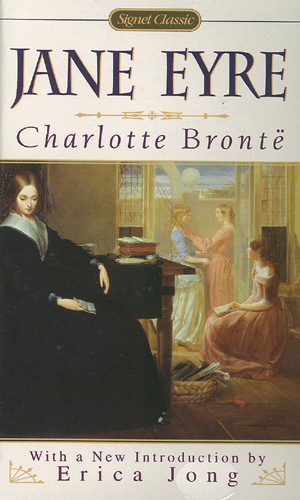Jane Eyre – Charlotte Brontë – 1847
Reviewed by: Barb Bowling Date: 6 November 2006
If you haven’t read this Gothic tale, you should. I first read this as a romance when I was sixteen and loved it, reread it as an adult and loved it even more. Gilbert and Gubar have a very revealing chapter on the feminist perspective of this book, in their ground-breaking critical work, Madwoman in the Attic, published in the seventies.
Bronte’s book is a great read about the difficult life and growth of an orphaned girl, who suffers much hardship and near starvation. Later as governess in a spooky manor house in the moors of northern England, she falls in love with the lord of the house who has a very dark secret that almost destroys her. Plus, the house is haunted…. Very mysterious–
The book Madwoman in the Attic by Gilbert and Gubar has a chapter that shows how Bronte’s house is even more “haunted” than we thought! Jane Eyre is such a great book, on so many levels.
If you really like this book, read the mysterious and tragic “story behind the story of Rochester” a novel by Jean Rhys, called Wide Sargasso Sea.
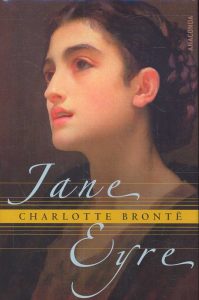
Posted by Joffre on 8/6/2013, 18:33:32
Tomorrow morning, I’ll finish Jane Eyre. This is the third time I’ve read it. Last time was around 2001. First time was 1993. It was one of the first novels I read when I began to read. I learned of it from some TV show.
I’m not sure why I’ve left it off my list of books I’ve especially enjoyed. I really do like it, all of it: Jane’s childhood in the home of Aunt Reed, her stay at Lowood School, the developing attachment to Mr. Rochester, the Gothic horror of mad Bertha (probably the scariest thing I’ve ever read). At first, I had a problem with Jane’s running away only to end up at the door of her long lost relatives, but I’ve related before how someone showed me that it was providence rather than coincidence. Her stay with the family is interesting. If there is anything I don’t like, it’s that it all seems to work out a little to well in the end, but perhaps Mr. Rochester would point out to me that he is missing an eye and a hand.
Bertha’s madness is very interesting. Much of what has been said about it is not. I read on wikipedia that some have attributed it to syphilis contracted from Rochester. What then of her mother’s insanity? Rochester says she comes from three generations of lunatics. He mentions someone else specifically, and also his belief that her brother Richard Mason will succumb eventually. Of course, this is just Rochester, not some disinterested third party, talking, and I suppose many people consider their mothers-in-law mad, but this seems like very creative reading to me.
I wish I had my copy of Wide Sargasso Sea here.
What other insane characters can you think of? Right now, I can only think of Renfield from Dracula. He too is very interesting.
~
Posted by Joffre on 8/6/2013, 22:22:58, in reply to “current reading: Jane Eyre”
I guess I can think of several novels that deal with a sort of insanity. Mrs. Dalloway has that guy with PTSD. Pale Fire has Kinbote. Perhaps what I’m interested in is a 19th century idea of insanity. The only other thing I can think of that seems to qualify is my favorite short story, The Yellow Wallpaper.
~
Posted by Sterling on 9/6/2013, 0:56:37, in reply to “Re: current reading: Jane Eyre”
Yes, “The Yellow Wallpaper” is a great example of 19th century madness. If you like that, I highly recommend “The Beckoning Fair One” by Oliver Onions (not quite 19th century, but published in 1911). Also, any number of works by Poe, Miss Havisham in Great Expectations, The Woman in White (and probably other Wilkie Collins that I have not read), and let’s not forget Wuthering Heights, which is pretty much a bat-sh*t crazy novel throughout! :^)
PS – It’s funny, with all the mentally unbalanced figures in modern fiction, Kinbote leapt to my mind as well.
~
Posted by Joffre on 9/6/2013, 12:00:13, in reply to “Re: current reading: Jane Eyre”
I suppose the first great novel, Don Quixote, is about madness or a mad character, but the comic is not what I want just now. I want a scuttling bug eater. Gothic insanity, I guess.
I don’t know The Beckoning Fair One. I’ll look into that.
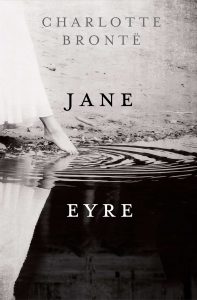
Posted by Lale on 9/6/2013, 12:13:53, in reply to “Re: current reading: Jane Eyre”
: and let’s not forget Wuthering Heights, which
: is pretty much a bat-sh*t crazy novel throughout! :^)
😀
You made me laugh. That’s so true.
Lale
~
Posted by Joffre on 9/6/2013, 14:43:56, in reply to “current reading: Jane Eyre”
I finished the book today. The reunion of Jane and Mr. Rochester seems as gripping as the rest.
I keep thinking about Bertha. She is fascinating. This kind of madness seems to exist mostly in 19th century novels, so I suppose it is the 19th century idea of madness – or the madness created by the 19th century, perhaps by the treatment of whatever was construed as madness to begin with. If Bertha’s present condition is the result of confinement and isolation, what was she like before being locked up? Rochester says she was unchaste. Could he not get a divorce from her on those grounds? Was there no divorce even for infidelity at that time? Would the stigma of divorce have been too much to contemplate? Rochester does not seem such a social being as to care so much for stigma.
I imagine two people married to each other by their relatives, two people who quickly find they share nothing, who come to loathe each other. She is in an inferior condition. Knowing full well what she is doing, she behaves in whatever way upsets him most. She screams, she breaks things. At what point does it become more than reason can understand? Perhaps at throwing feces or something like that. At what point does Rochester lock her up? Perhaps if she becomes dangerous, a starter of fires, it no longer matters much whether she understands what she’s doing.
If Bertha was cognizant when locked up, why didn’t she run away when she got out of her room? Is it that she has less courage than Jane? Perhaps, confinement and isolation had driven her truly mad before she got the chance. Rochester says she has gotten out of her room twice. Both instances occur during Jane’s residence in the house. I forget how long Bertha must have been in the attic before that time.
All that said, I do think C.B. believed in Bertha’s pre-existing madness.
By the way, Sterling, I got The Beckoning Fair One on kindle. I will read it now.
~
Posted by Lale on 10/6/2013, 16:28:57, in reply to “Bertha”
I read Jane Eyre when I was 12 years old and I consider it to be the first novel I read that was not written for children.
Since then, I have not re-read it. Just reading the little portions you are summarizing here, it seems like Rochester has been guilty of far worse than I thought at the age of 12. Back then, being a handsome and a rich bachelor, he had seemed to be innocent or even a victim. Today, I find what he did abhorrent. Not only he locked up a human being but also he tried to marry (a young, unsuspecting woman) illegally.
Lale
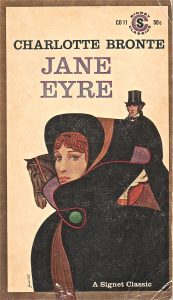
Posted by Joffre on 10/6/2013, 19:00:14, in reply to “Re: Bertha”
I thought women generally loved Mr. Rochester. I don’t think he’s at all a bad man. As I said, I think CB believed in Bertha’s inherited insanity. Locking her in the attic with a nurse of his choosing was probably much better than sending her to an asylum. Apparently the laws of the time prohibited him from divorcing the lunatic he was tricked/forced into marrying. He could have put her away in his other house which he remarks is no more salubrious a place than Lowood school, a place where she would probably have died and freed him. I certainly don’t blame him for trying to circumvent the laws of his time that apparently kept him tied to a raving lunatic. He, himself, says later that he was wrong and punished by God for it though.
I was just theorizing about Bertha because this rather fascinating insanity seems mostly to be a feature or product of the 19th century. Perhaps I’m wrong about that. Perhaps there are and only ever were a very few cases like Bertha’s. My sister worked at a mental hospital where there was some guy who was always trying to bite people’s feet. Or perhaps it’s that modern medication prevents people from being like Bertha. I hope Sterling can give some feedback.
~
Posted by Sterling on 10/6/2013, 22:04:36, in reply to “Re: Bertha”
Well, Joffre, we don’t see that much of this sort of thing today due to modern medications. However, I worked in Alabama’s huge state mental institution in the 1990s. There were about 1500 patients then, and I worked the floors with the most difficult patients. They did not respond well to medication. I have had a smallish woman pick up a heavy chair to hit me over the head with it. Only the intervention of an even more dangerous patient saved me. (She had a crush on me, I think.)
Later, I worked in the acute psychiatric unit of the local hospital. The staff was mostly women, so I personally had to restrain and take down patients. I used to joke (rather grimly) that I went to school for 10 years and earned a doctorate just so that I could take my tie off and go fight (literally) with terrified, frantic paranoid schizophrenics and violently aggressive manics. I could tell many stories of eerie madness or raging insanity. Fortunately, probably 95% of them can be stabilized with medication.
So I don’t think that this kind of madness was somehow limited to the 19th century. It’s just that we can treat them now. They had basically no treatment whatsoever for extreme cases before, say, 1950.
~
Posted by Nora22 12/12/2014, 16:36:38, in reply to “Re: Bertha”
My dad was into etymology. He said that CB’s message was that Bertha got syphilis from her premarital promiscuity, which is why her family was happy to send her and her L30,000 off with an unsuspecting foreigner. Not only was her insanity largely due to syphilis, but Rochester himself is showing signs of the same. What if his abrupt manner and moodiness is that CB based him on Lord Rochester, who died of syphilis 100 years before? What if he is after Jane because she is ‘plain’ and certain to be a virgin to cure him of his disease? That’s what I get from his words in the book.
~
Posted by Lale on 12/12/2014, 20:47:24, in reply to “Re: Bertha”
Hi Nora22,
A very interesting approach. Thanks for sharing.
Lale
~
Posted by Sterling on 24/7/2014, 21:41:08
A few days ago, I finished Jane Eyre, which was the third of my “gap fillers,” but I think it’s time to stop counting.
I enjoyed it quite a bit. Which is perhaps surprising, since the gender split list considers JE to be the prototypical example of the “girl’s book.” Or maybe not so surprising, since I believe that all the male regulars on this site have weighed in as liking it.
Jane herself is a very complex and interesting character. While she is very much a woman of her time, there is something proto-feminist about her. This is particularly evident when dealing with anyone but Rochester. She is defiant as a child, feisty as a schoolgirl, and assertive when asked by Rivers to abandon love for a life of Christian duty. Even at Thornfield, when she is hopelessly in love, she attempts to maintain her dignity and honor in the face of the scorn of the wealthy.
By far the most interesting section of the novel is the middle, at Thornfield. Who can resist a homicidal madwoman escaping from the attic and prowling the house at night? I’ll bet Stephen King wishes he’d thought that one up!
I don’t know where I’ll go next. I’ve thought of Dorian Gray, The Golden Bowl, and Pamela. I’ve been reading a little nonfiction the last few days to “cleanse my palate,” so to speak.
I’ll keep you posted.
~
Posted by guillermo maynez on 25/7/2014, 13:08:44, in reply to “Jane Eyre”
Harold Bloom challenged male readers to read the final paragraph without “shivers down your spine”. I couldn’t. I got the shivers all over me.
“Jane Eyre” is, in my opinion, mistakenly classified as a “girls only” novel. In fact, any book that should only be read by “males” or “females” (or blacks or whites, or whatever any other distinction) can’t be really good. JE is hard to forget, the character is creepy and lovable in turns, and certainly the madwoman is delightfully frightening.
Any one of your following three choices sounds great.
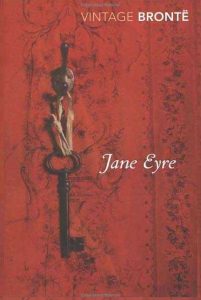
Posted by Joffre on 25/7/2014, 20:33:55, in reply to “Re: Jane Eyre”
Jane Eyre was among the first of my serious reading, and I loved it then, and when I read it for the third time early this year.
In that third reading, I was impressed by how romantic it is in every way. It makes going out to get a job sound like an adventure.
Bertha. What’s your diagnosis, Sterling? I suppose the diagnosis doesn’t matter. Does she seem realistic? Have you seen patients like that?
It must be quite disturbing to meet those people in real life. It’s fascinating in literature. For me, the best part of Dracula is Renfield.
My next book will be The Tin Drum because I read the first line somewhere and saw that the narrator is in an asylum or something.
I hope it will be fascinating somehow. The madness of Kinbote in Pale Fire doesn’t do much for me. I like PF well enough, but that madness is too tame.
~
Posted by Sterling on 26/7/2014, 12:46:25, in reply to “Re: Jane Eyre”
In the early stages of my career, I spent a lot of time working in hospitals and facilities for the seriously mentally ill. This included some highly dangerous patients. We know very little of Bertha, but it appears that she is schizophrenic. Her madness is apparently too unremitting to be manic-depressive (Bipolar I D/O), although she could be schizoaffective. Her hatred and violence suggests a paranoid aspect to her illness, but that is going way out on a speculative limb.
And yes, I’ve seen patients like that, although mostly they are less dramatic because modern medications are reasonably effective. I’ve seen some, though, that the medications didn’t work on. And I’ve heard blood-chilling stories. A man once told me how he spent hours in an unlit bathroom with a huge butcher knife waiting on his wife to come home. He had decided that she was unfaithful (which he now recognized as a delusion). Fortunately, she was not killed when he leapt screaming from the bathroom and stabbed her. (Perhaps the worst part to me was his description of giggling and chuckling as he waited in the dark bathroom, unable to control his mirth.)
They are disturbing in real life, although as a doctor, regardless of what they have done while under the influence of their illness, one realizes that they, too, are suffering patients who need help. (I think I’ll read Wide Sargasso Sea by Jean Rhys to get someone else’s take on Bertha.)
I wonder if Charlotte was romantic? Her creation Jane certainly is, although she has a very sensible streak.
I read The Tin Drum so many years ago that I remember almost nothing. I don’t know if the lead character is really insane, however. I should re-read it myself. It has retained its reputation. It is considered one of the finest German novels of the twentieth century:
http://en.wikipedia.org/wiki/Best_German_Novels_of_the_Twentieth_Century
I may read more Charlotte, but I’m thinking that my next Brontë will be The Tenant of Wildfell Hall. Give the least celebrated of the Brontë sisters a chance. I also need to re-read Wuthering Heights. It’s been many years.
~
Posted by Lale on 27/7/2014, 8:51:37, in reply to “Re: Jane Eyre”
The Tin Drum begins with “Granted, I am an inhabitant of an insane asylum.” Slightly varies in different translations.
It is a crazy book because it is taking place in a crazy time. It is not for everyone. I liked portions of it but not all of it. There are some very vivid scenes one can not forget. I still remember some of the most violent scenes and it has been 20 years since I read it.
On madness and mental institutions, Maurice Blanchot’s La Folie du jour (Madness of the Day) is, I believe, worth checking out. It is supposed to be a 32-page novella. I am also interested in reading his Death Sentence.
Lale
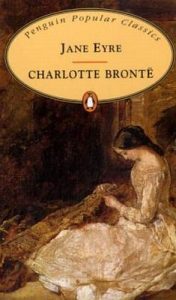
Posted by Joffre on 1/8/2014, 20:07:08, in reply to “Jane Eyre”
Have you read A Room of One’s Own? It has some very interesting comparisons of Jane Austen and Charlotte Bronte.
And, I wondered, would Pride and Prejudice have been a better novel if Jane Austen had not thought it necessary to hide her manuscript from visitors? I read a page. or two to see; but I could not find any signs that her circumstances had harmed her work in the slightest. That, perhaps, was the chief miracle about it. Here was a woman about the year 18oo writing without hate, without bitterness, without fear, without protest, without preaching. That was how Shakespeare wrote, I thought, looking at Antony and Cleopatra; and when people compare Shakespeare and Jane Austen, they may mean that the minds of both had consumed all impediments; and for that reason we do not know Jane Austen and we do not know Shakespeare, and for that reason Jane Austen pervades every word that she wrote, and so does Shakespeare. If Jane Austen suffered in any way from her circumstances it was in the narrowness of life that was imposed upon her. It was impossible for a woman to go about alone. She never travelled; she never drove through London in an omnibus or had luncheon in a shop by herself. But perhaps it was the nature of Jane Austen not to want what she had not. Her gift and her circumstances matched each other completely. But I doubt whether that was true of Charlotte Brontë, I said, opening Jane Eyre and laying it beside Pride and Prejudice.
I opened it at chapter twelve and my eye was caught by the phrase ‘Anybody may blame me who likes’. What were they blaming Charlotte Brontë for? I wondered. And I read how Jane Eyre used to go up on to the roof when Mrs Fairfax was making jellies and looked over the fields at the distant view. And then she longed — and it was for this that they blamed her — that ‘then I longed for a power of vision which might overpass that limit; which might reach the busy world, towns, regions full of life I had heard of but never seen: that then I desired more of practical experience than I possessed; more of intercourse with my kind, of acquaintance with variety of character than was here within my reach. I valued what was good in Mrs Fairfax, and what was good in Adele; but I believed in the existence of other and more vivid kinds of goodness, and what I believed in I wished to behold.
‘Who blames me? Many, no doubt, and I shall he called discontented. I could not help it: the restlessness was in my nature; it agitated me to pain sometimes. . . .
‘It is vain to say human beings ought to be satisfied with tranquillity: they must have action; and they will make it if they cannot find it. Millions are condemned to a stiller doom than mine, and millions are in silent revolt against their lot. Nobody knows how many rebellions ferment in the masses of life which people earth. Women are supposed to be very calm generally: but women feel just as men feel; they need exercise for their faculties and a field for their efforts as much as their brothers do; they suffer from too rigid a restraint, too absolute a stagnation, precisely as men would suffer; and it is narrow-minded in their more privileged fellow-creatures to say that they ought to confine themselves to making puddings and knitting stockings, to playing on the piano and embroidering bags. It is thoughtless to condemn them, or laugh at them, if they seek to do more or learn more than custom has pronounced necessary for their sex.
‘When thus alone I not unfrequently heard Grace Poole’s laugh. . . . ’
That is an awkward break, I thought. It is upsetting to come upon Grace Poole all of a sudden. The continuity is disturbed. One might say, I continued, laying the book down beside Pride and Prejudice, that the woman who wrote those pages had more genius in her than Jane Austen; but if one reads them over and marks that jerk in them, that indignation, one sees that she will never get her genius expressed whole and entire. Her books will be deformed and twisted. She will write in a rage where she should write calmly. She will write foolishly where she should write wisely. She will write of herself where she should write of her characters. She is at war with her lot. How could she help but die young, cramped and thwarted?
One could not but play for a moment with the thought of what might have happened if Charlotte Brontë had possessed say three hundred a year — but the foolish woman sold the copyright of her novels outright for fifteen hundred pounds; had somehow possessed more knowledge of the busy world, and towns and regions full of life; more practical experience, and intercourse with her kind and acquaintance with a variety of character. In those words she puts her finger exactly not only upon her own defects as a novelist but upon those of her sex. at that time. She knew, no one better, how enormously her genius would have profited if it had not spent itself in solitary visions over distant fields; if experience and intercourse and travel had been granted her. But they were not granted; they were withheld; and we must accept the fact that all those good novels, Villette, Emma, Wuthering Heights, Middlemarch, were written by women without more experience of life than could enter the house of a respectable clergyman; written too in the common sitting-room of that respectable house and by women so poor that they could not afford to, buy more than a few quires of paper at a time upon which to write Wuthering Heights or Jane Eyre. One of them, it is true, George Eliot, escaped after much tribulation, but only to a secluded villa in St John’s Wood. And there she settled down in the shadow of the world’s disapproval. ‘I wish it to be understood’, she wrote, ‘that I should never invite anyone to come and see me who did not ask for the invitation’; for was she not living in sin with a married man and might not the sight of her damage the chastity of Mrs Smith or whoever it might be that chanced to call? One must submit to the social convention, and be ‘cut off from what is called the world’. At the same time, on the other side of Europe, there was a young man living freely with this gypsy or with that great lady; going to the wars; picking up unhindered and uncensored all that varied experience of human life which served him so splendidly later when he came to write his books. Had Tolstoi lived at the Priory in seclusion with a married lady ‘cut off from what is called the world’, however edifying the moral lesson, he could scarcely, I thought, have written War and Peace.
———————-
The sentence that was current at the beginning of the nineteenth century ran something like this perhaps: ‘The grandeur of their works was an argument with them, not to stop short, but to proceed. They could have no higher excitement or satisfaction than in the exercise of their art and endless generations of truth and beauty. Success prompts to exertion; and habit facilitates success.’ That is a man’s sentence; behind it one can see Johnson, Gibbon and the rest. It was a sentence that was unsuited for a woman’s use. Charlotte Brontë, with all her splendid gift for prose, stumbled and fell with that clumsy weapon in her hands. George Eliot committed atrocities with it that beggar description. Jane Austen looked at it and laughed at it and devised a perfectly natural, shapely sentence proper for her own use and never departed from it. Thus, with less genius for writing than Charlotte Brontë, she got infinitely more said.
I would like very much to know what exactly she was thinking of in saying Charlotte Bronte had more genius that Jane Austen. I don’t presume to disagree; I just wonder.
~
Posted by Sterling on 2/8/2014, 9:10:57, in reply to “Re: Jane Eyre and Virginia Woolf”
If I read this excerpt correctly, Woolf takes Jane Eyre’s hunger for experience to be Charlotte Brontë’s. Austen, on the other hand, seems to have had no more ambition than to write perfect little comedies of her narrow world. Woolf argues that Brontë might have been capable of writing a huge encyclopedic novel of life like War and Peace if only society had allowed her the freedom to learn the breadth of life that Tolstoy was allowed.
Doubtless, from my own humanist/feminist viewpoint, it is regrettable, even criminal, that Brontë, Eliot (Mary Ann Evans), and all other women from the dawn of time have had their lives limited and narrowed by paternalistic society. It is similar, in some ways, to racism and other forms of oppression. Several questions arise, though. First, would broader experience have led such geniuses as Brontë and Eliot to write better novels than Jane Eyre and Middlemarch? Is it wrong for Austen to be content with her lot and write about the narrow world that she knew? (Woolf seems to take this for granted. In this way she reminds me of the late 20th century feminists who believed that all women must be career women and scorned those women who chose to lead lives as housewives and mothers.) And finally, is War and Peace really a better novel than Pride and Prejudice?
~

- Related:
- Book Reviews



